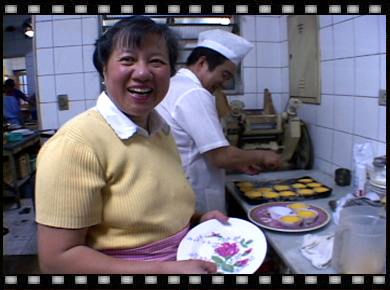Brazil South
Synopsis:
Lee Ho Shau and his future wife Wong Yim Sheung swam from China to Macau, and freedom, during China’s Cultural Revolution in the 1960’s. They made their new life in Sao Paolo dedicated to perfecting the fine art of Chinese cuisine. On the eve of the World Cup final, their son, Luis, recounts his passion for soccer and what it means to grow up Chinese-Brazilian. As Brazil won its championship, the streets of Rio de Janeiro exploded as Luis celebrated with tens of thousands of fans.
Opening Sequence:
The World Cup was furthest from my mind when I booked our trip to Brazil. In fact, we had more World Cup fervour while filming in Havana two weeks before, when the Koreans were beating everybody and became the darling of the tournament. Hence, Kwoi and I became instant Koreans. The mood in Sao Paulo, though, was no less jubilant now that Brazil had made it to the finals. Nowhere was it more evident than in the form of Luis, the son of our owner couple, who had recently moved back from Canada to look for opportunities at home.
Closing Sequence:
The crowd yelling ‘penta, penta’ up and down Paulista Avenue was delirious. Giant monitors that normally served as video billboards for Petrobras and Panasonic were getting live television feeds of the Brazilian team hoisting its fifth World Cup in Yokohama. For the next few days, the cheering crowd seemed to follow us around everywhere we went. It was only in Rio de Janeiro one afternoon that I caught a moment of calm on Sugarloaf Mountain watching the sun set over Christ the Redeemer, as darkness descended silently onto Ipanema Beach below and Antônio Carlos Jobim airport in the distance.
Musical Landscape:
Brazil South Musical Landscape, Lumb & Giancola
Escravo da Alegria, Toquinho and Vinicius de Moraes
I had come to Brazil for bossa nova. And although we did not have to film in Rio de Janeiro, I could not help but go there to soak up the atmosphere and to linger around the beaches where Vinicius de Moraes, Antônio Carlos Jobim and João Gilberto created their swaying bossa nova out of the rhythmically infectious samba. And I have been forever grateful to them. I grew up with Brazilian music in Japan in the late sixties, often dropping in on jazz clubs in Yokohama where Japanese trios would play Mas que nada with imported vocals from the Philippines.

